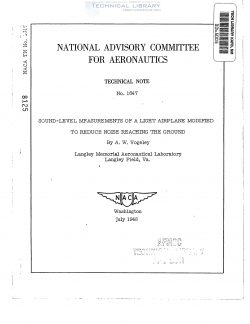naca-tn-1647
- Version
- 71 Downloads
- 965.56 KB File Size
- 1 File Count
- December 4, 2016 Create Date
- December 4, 2016 Last Updated
National Advisory Committee for Aeronautics, Technical Notes - Sound Level Measurements of a Light Airplane Modified to Reduce Noise Reaching the Ground

An army liaison-type airplane, representative of personal airplanes
in the 150 to 200 horsepower class, has been modified to reduce propeller
and engine noise according to known principles of airplane-noise reduc-
tion. Noise-level measurements demonstrate that, with reference to an
observer on the ground, a noisy airplane of this class can be made quiet -
perhaps more quiet than necessary. In order to avoid extreme and unneces-
sary modifications, acceptable noise levels must be determined.
An important factor in the problem of increasing the utility of the
personal airplane is the provision of more convenient access to airports.
For this reason it is desirable that airports be close to centers of
population. Strong objections to the noise of airplanes are, however,
seriously hindering the proper development and location of airports. A
solution to the problem of airplane-noise reduction is therefore necessary
to the healthy growth of personal and commercial aviation.
The National Advisory Committee for Aeronautics first began to inves-
tigate airplane noise in about 1930. Emphasis was placed almost entirely
on the study of propeller noise. Since that time a theory for predicting
propeller noise has been developed and a number of papers which aid in
the design of quiet propellers for personal airplanes have been issued.
These, and other papers relating to the noise problem, are listed as
references 1 to 10. Increased emphasis has recently been placed on this
work because of the expanding personal-airplane market.
In addition to the theoretical and ground test work, a typical light
airplane has been modified for flight tests to determine the applicability
of the published data. This modified, or quiet, airplane was first flown
and demonstrated at the Sixteenth Annual Inspection at the Langley Labor-
atory in May lQhT. Since that time, this airplane has been tested and
the test results compared with those for the unmodified airplane. The
results of these tests, showing the sound-pressure levels of both air-
planes as measured from the ground, are presented in this paper.
| File | Action |
|---|---|
| naca-tn-1647 Sound Level Measurements of a Light Airplane Modified to Reduce Noise Reaching the Ground.pdf | Download |
Comment On This Post